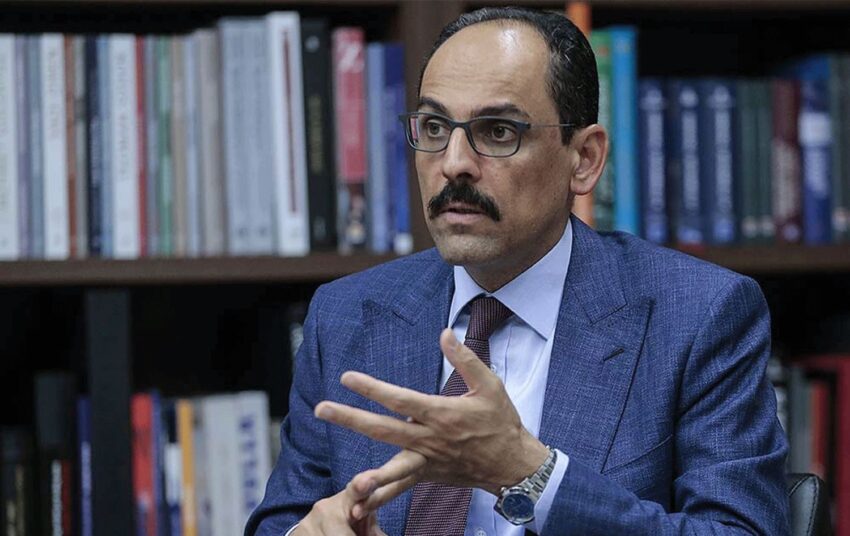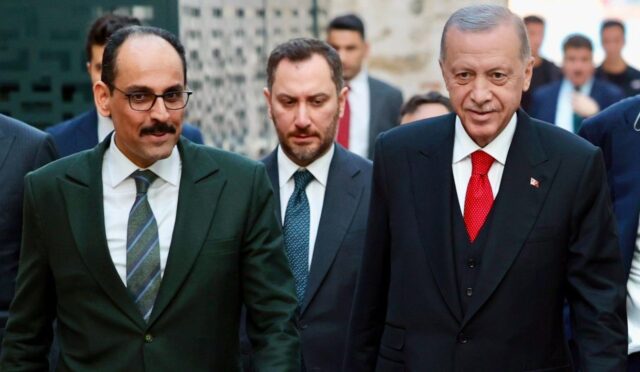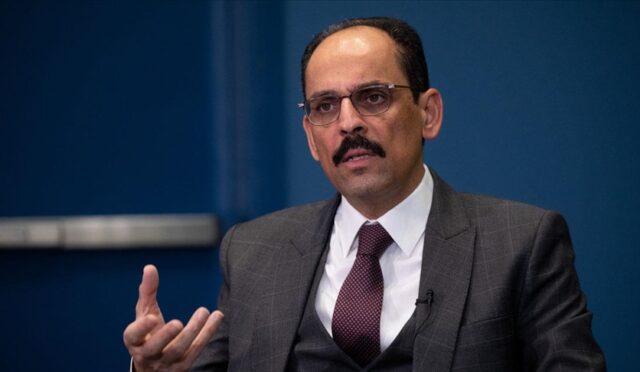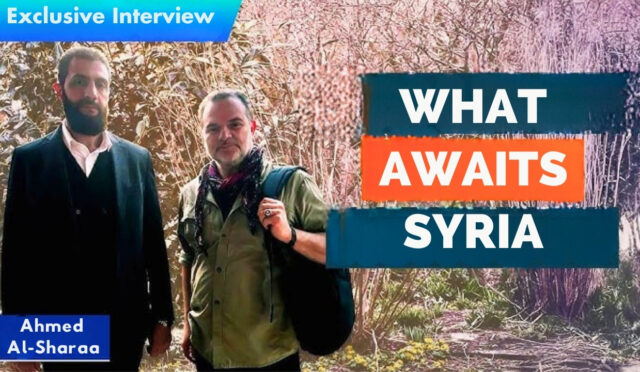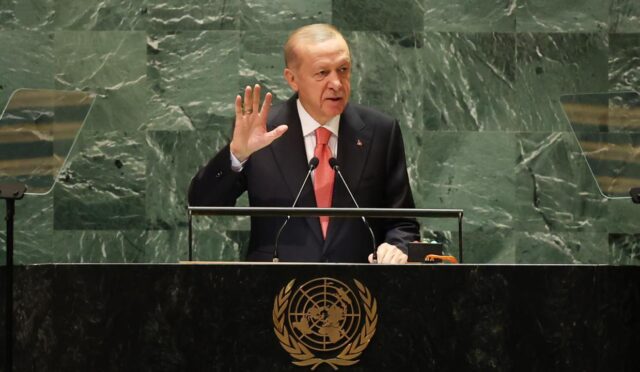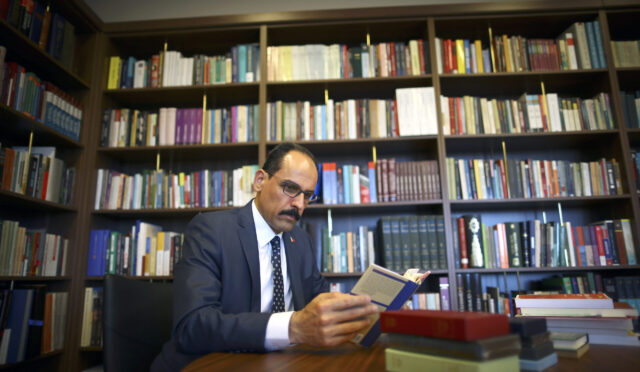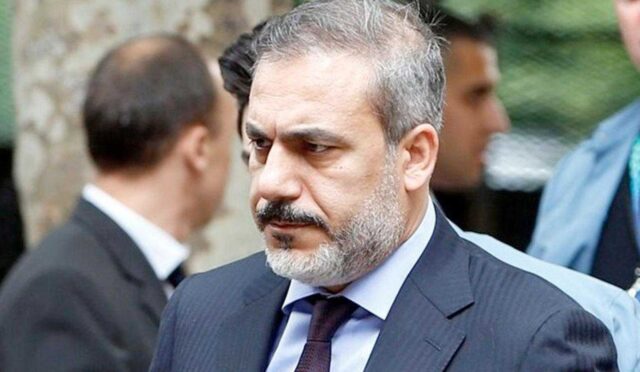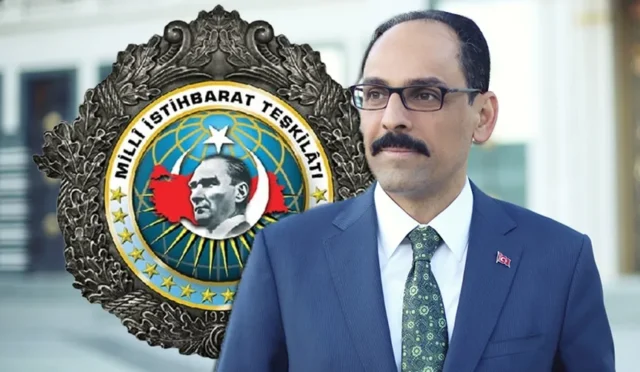We came across a 2018 interview where İbrahim Kalın elaborates on his critique of the Islamic world’s ‘easy habit of blaming the West’ from an orientalism conference. As he wasn’t yet head of Turkish intelligence, Kalın seems to express himself more freely. Here are some excerpts from the interview:
Presidential Spokesperson İbrahim Kalın Examines the West’s Concept of Civilization in His New Book ‘Barbarian, Modern, Civilized’
In his new book, Barbarian, Modern, Civilized, Presidential Spokesperson İbrahim Kalın scrutinizes the West’s understanding of civilization. According to Kalın, the West used this concept as a tool for colonization. So, how did Islamic civilization fall behind Europe, and where did it go wrong? Is the EU reluctant to accept us because we are not ‘civilized’ enough? We discussed both the book and current issues with Kalın in light of its insights.
The West Has Exhausted Its Discourse on Civilization, While the Islamic World Seeks Its Voice
You open the book with an intriguing news story from 2018. Can you tell us about it?
Scientists conducting research in the Amazon rainforest using drones came across a tribe. They described it as “isolated from civilization, unfamiliar with technology, primitive yet skilled with bows and arrows, and fearful of the outside world.” The final sentence of the report is even more striking: “Last year, gold miners killed around 10 members of this tribe…” When you read that last sentence, you can’t help but ask, “Who is the primitive, uncivilized barbarian here, and who is the civilized one?” These people living in the forest are at peace with nature and themselves, yet outsiders come, driven by greed for gold, and kill them. Still, the tribe is labeled as barbaric. Isn’t there a glaring contradiction here? Today, we are simultaneously living both barbarism and modernity. We claim to live in an age of progress, but look at the history of the 20th century: World War I, World War II, the Holocaust, the Bosnian Genocide, the events in Rwanda, weapons of mass destruction, global warming… The unchecked expansionism of savage capitalism, the Palestinian issue, occupations, wars—when you stack these up, you see numerous modern examples of barbarism.
Are We Misusing the Concepts of ‘Barbarian,’ ‘Modern,’ and ‘Civilized’?
This is a situation imposed on us by the conceptual framework constructed by post-Enlightenment thought in the 18th and 19th centuries, rooted in a Eurocentric perspective. Here, ‘barbarian’ refers to societies that have not Westernized or modernized in the Western sense. Europeans claimed they were bringing civilization to the places they colonized. To justify this, they invented the term ‘civilizing mission.’ When the French occupied Africa, the British colonized India, or the Dutch took over Indonesia and Malaysia, they said, “We’re not doing anything wrong; we’re bringing them civilization.” The initial assumption needs to be fundamentally questioned. How did they conclude that a Chinese, African, Indonesian, or Indian person lacks civilization? How did they impose their own social, political, and economic standards as the absolute definition of civilization?
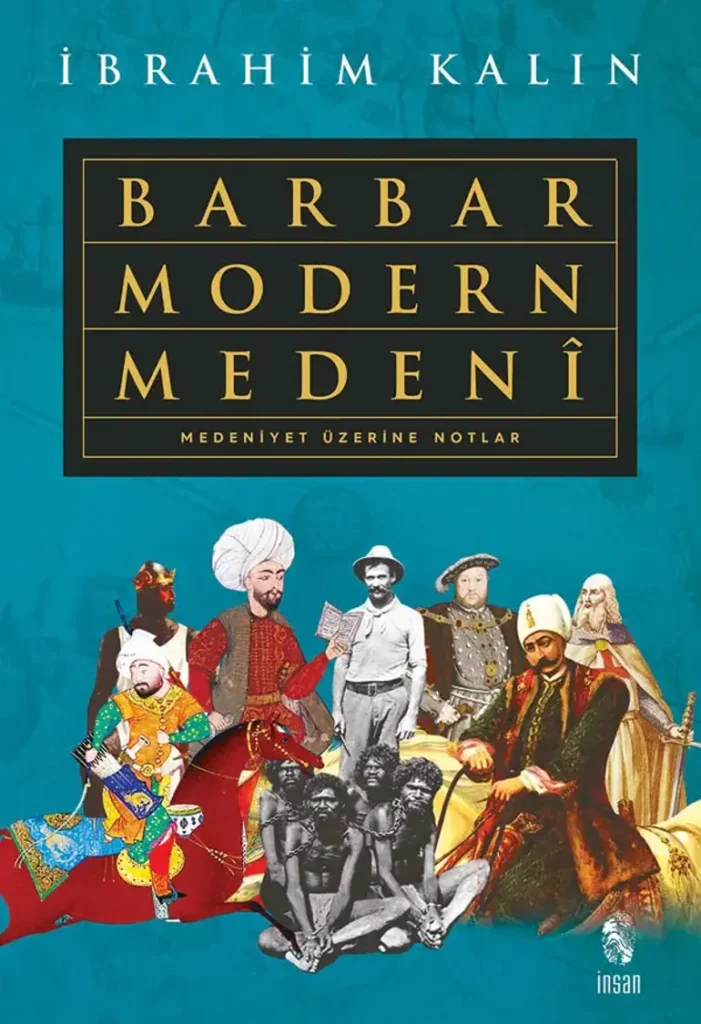
Are We Still Operating with a Eurocentric Perspective?
We haven’t entirely freed ourselves from it. We still operate within this historical-intellectual framework. For the past 150 years, civilization has been a concept that never left the agenda but has been equally battered, abused, and misused. Without forgetting its historical background, we need to liberate the concept from its colonial connotations and redefine it within a new framework. Civilization, in the sense of humanity, civility, rationality, morality, and virtue, is a value. It can provide a vital foundation for societies to live in accordance with their own histories and traditions and to establish a peaceful world order. This is precisely the idea behind the ‘Alliance of Civilizations’ initiative, launched in 2005 by our President, then Prime Minister, together with Spain. It was a response to the ‘Clash of Civilizations’ frenzy initiated by Huntington. The premise is that different civilizations exist, but they don’t have to fight or clash; they can coexist and strive for the ‘common good.’ This is why the initiative was established.
So, You’re Saying: ‘The West Used the Concept of Civilization as a Weapon!’ Is That Correct?
Absolutely. Especially in the 19th century, the West used the concept of civilization as a tool for colonization. They convinced themselves that what they were doing was not colonialism or imperialism but a civilizing mission. They accused nations resisting colonialism of being barbaric and anti-civilization. Within the West, thinkers like Nietzsche, Spengler, and Heidegger questioned this usage. Whether they proposed an alternative is debatable. We need to sit down and ask ourselves: What is civilization, and how can we strip it of these negative connotations? Before doing so, we must conduct a historical reckoning of the relationship between civilization and colonialism.
At This Point, We Must Recall the ‘Human Zoos’ You Mention, a Pivotal Part of the Book. I Was Unaware That People Were Exhibited in Brussels as Late as 1958…
Human zoos began in the second half of the 19th century and continued until 1958—a shameful practice. Under the guise of modernity, so-called primitive tribes were exhibited like animals in these zoos. At one exhibition, a sign read, “Do not give food or drink to the Congolese; their meals have been provided.” These people were treated like animals. The fact that the final exhibition took place as late as 1958, in the heart of Europe, in Brussels, should provide sufficient insight into the notions of modernity, racism, colonialism, and the belief in cultural superiority.
Didn’t Any Protests Arise from the ‘Civilized West’?
Some voices were raised, but it’s hard to say this became a widespread societal consciousness. Millions of people visited these human zoos. Behind this, of course, lies Social Darwinism. These were seen as subhuman beings stuck at the lower rungs of evolution, and modern civilized people were supposedly doing them a favor. In reality, they were uprooting them, transporting them to foreign lands, climates, and geographies. Many died of disease en route. There’s an immense barbarity behind this.
We Often Say, ‘Be a Bit Civilized’ in Everyday Life. What Do We Really Mean?
This is one of the finest expressions of folk wisdom. One of the greatest achievements of tradition is the transmission of ideas tested across generations to the present. Since these ideas have been tested, refined, and passed down, they carry a claim to universality. The phrase “Be a bit civilized” essentially means “Be rational and moral.” That’s the essence of civility. You can apply this whether you’re playing sports, engaging in politics, conducting business, or farming your land. When you abandon morality in the name of rationality, you end up with rational barbarism. For example, if, driven by the desire to win, you pollute the environment or exploit labor, that’s not moral. Ultimately, it’s not rational either, because you cannot separate the rational from the moral. The result is neither a rational nor a moral act. The system produces such massive flaws that people become alienated from themselves. People become unhappy…
Has the Concept of Morality Been Hollowed Out, Just Like Civilization?
There’s a global system that preaches morality while undermining moral values. The international order is said to be based on law, human values, and the sanctity of human life. Yet, in practice, we face a structure that hollows out these principles. We consume excessively, driven by an insatiable greed for profit. We are disrupting the balance entirely.
How Was the Perception of ‘Uncivilized East, Civilized West’ Created?
Until the 19th century, no nation we now call Middle Eastern or Eastern saw itself as “Eastern” in quotation marks. When the West began calling itself “Western,” others became “Eastern.” The West produced this dichotomy and otherized the East. Think of Ibn Sina. He lived in the Mesopotamian region but never saw himself as an Eastern philosopher. Ibn Rushd, from Cordoba, never saw himself as a Western philosopher. Fatih Sultan Mehmet never saw himself as an Eastern sultan, emperor, or commander. In the modern era, it was said: “The West is good, rational, developed, progressive, democratic, pluralistic…” These idealized concepts emerged within an extraordinary set of ideas produced by 19th-century European politics, thought, art, and education. The political backdrop to this was colonialism.
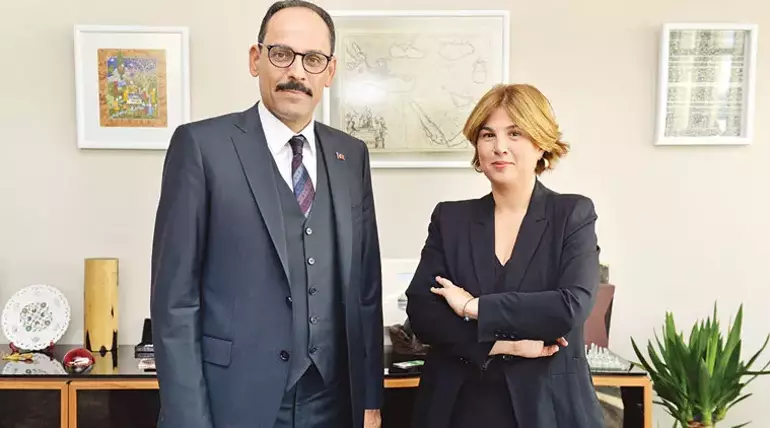
Did Non-Western Societies Fail to Recognize This Challenge in Time?
They were late to respond. They struggled to determine where and when to intervene in this historical process. They faced a new power they didn’t recognize. For the first time, they encountered a world that came not only with armies but with scientists, artists, historians, educators, and jurists who categorized societies, saying, “We are modern, we are advanced, we are civilized; you are not yet there.” A striking example is Napoleon’s expedition to Egypt. Napoleon brought hundreds of scientists with him. His goal wasn’t just to conquer Egypt and limit the British but to reproduce and present French culture and history through Egypt to the world. A saying attributed to Napoleon captures this: “The West cannot achieve the idea of greatness without conquering the East.” During this process, Turks, Persians, Arabs, and Chinese failed to fully grasp this challenge. They were preoccupied with practical problems: armies at their gates, weakened economies, internal disunity. When this wave hit, some chose complete isolation, others launched resistance movements, and some said, “We need to understand this modernization, see what’s happening in the West, and adopt technology and science,” choosing different paths. Europe made a significant leap, seizing dominance. We must acknowledge that non-European societies were significantly delayed in reading this historical process.
What Is the Situation Today?
Today, the West has exhausted its discourse on civilization, while the Islamic world is searching for its voice. The West maintains a strong tradition of self-criticism, rigorously examining its history, civilization, philosophy, and art. This is a creative process that sustains Western thought. However, when we look at the set of values presented as ‘civilization’ as a whole, we see it increasingly focusing on micro-issues and narrowing its horizons. In contrast, the Islamic world is aware of its rich civilizational heritage, recognizing that for nearly a thousand years, the greatest contributions to culture, art, civilization, science, and urban development emerged from this region. Yet, its current reality is far removed from that legacy. We need to ask, “How can we accurately interpret this tradition, draw from its insights, and build our civilization today?” In doing so, we must engage in a new intellectual endeavor, reading and shaping the present and future without isolating ourselves from the world or succumbing to a Third Worldist mindset.
Are You Optimistic?
Today, the Islamic world is plagued by wars, terrorism, sectarian tensions, internal conflicts, ignorance, and poverty—many bleeding wounds. Yet, the Islamic world is striving to rediscover its own tradition. I cannot say this effort has been very successful, as we have not yet fully grasped the importance of anchoring ourselves to a tradition. Historically, all great nations that left their mark on the world succeeded to the extent that they were connected to a deep-rooted foundation, a constant, a harbor. At the same time, the Islamic world is trying to understand today’s world. This approach can keep intellectual life vibrant in the Islamic world. However, when we truly tap into the rich wellspring of our tradition, we will be able to better position ourselves within history. This will provide us with the opportunity to build a future on more solid foundations.
Let’s Turn to the Relationship with Religion… How Was ‘Modernity Equals the Death of God’ Perceived?
That’s Nietzsche’s famous observation… Once God, as the absolute authority and the source of truth, goodness, and beauty, is set aside, Nietzsche argues that God is effectively dead. In its place, modernity seeks to build a new world through reason, from a secular perspective. What’s interesting is this: Enlightenment thought, which placed reason, the individual, freedom, and will in God’s place as absolute, eventually began questioning its own absolutism. As Hannah Arendt put it, “One of the greatest problems today is: According to what set of criteria will we establish the framework that leads us to a meaningful life?” The glue that holds us together has disintegrated.
Was That Glue the ‘Search for Meaning’?
Yes, it has been so atomized and fragmented that everyone is searching for something, but nothing meaningful emerges from the sum of these efforts. The question today is: Will we draw this from religion, history, Jerusalem, or ancient Greece? The answer is still being sought.
According to Namık Kemal, Muslims Fell Behind Because They Abandoned the Principles of Islam. Do You Agree?
That’s one observation, but it doesn’t capture the full picture. We need to know which principles of Islam were abandoned to produce this outcome. The Qur’an frequently emphasizes contemplation, thinking, research, inquiry, understanding the world, and living together while preserving differences; it speaks of knowledge, wisdom, and aesthetics. When we consider all these together, we might recall which principles of Islam were lost and in what way.
Why Did the Scientific Revolution or the Industrial Revolution Happen in the West and Not in the Islamic World?
Muslim societies could have achieved a scientific revolution, but at some point, they began to believe that what they had was sufficient. They saw new pursuits as unnecessary. A narrowing of horizons occurred. The madrasas failed to meet the standards required by the needs of the time. Opinion leaders failed to fully grasp the pace of transformation. By the time they did, it was too late.
Is It Possible to Find Meaning in the World of Technology?
It depends on how a person chooses to find meaning in their life. Some may find meaning in technology. But technology is something that is quickly produced and quickly consumed. Two years from now, there will be new technology. Will the meaning of our lives change with every new technology? The meaning of life should rest on more stable, deeper principles to have a real impact on our lives—peace, happiness, inner harmony. Technology is a tool, but like every ambitious tool, it seeks to position itself as an end in itself. As rational and virtuous beings, we must resist this. How can we allow something we created with our own hands to enslave us? In today’s modern, technological world, the priority is not a meaningful life but success, profit, career, wealth, fame, and so on. We need to question whether the sum of these produces a happy life. If you forget that a tool is just a tool, you also forget the purpose.
You Say, “In Such a Virtual and Superficial World, It’s Increasingly Difficult to Say Something About What Is Real, What Is Culture, What Is Art, or What Is Aesthetic.”
That’s right, because we now live everything within an ontology of screens. We think we can’t understand the world, help a friend in need, or plan our day without looking at screens. We try to extract truth, reality, humanity, the search for freedom, and meaning through a screen. We miss the ‘moment.’ We’ve become unable to live the moment.
It Seems Like Some People Do Things Just to Post a Photo on Instagram. We Know of People Who Go to a Museum’s Entrance, Take a Photo, and Leave Without Entering.
That’s exactly it, isn’t it? It’s using reality not as reality but as a tool for the thrill of sharing. Sharing isn’t bad, but the essence is for a person to live that moment. If you go to the Taj Mahal, Süleymaniye Mosque, or Topkapı Museum, or sit on the Aegean coast, or climb Ilgaz Mountain, the primary goal should be to experience that moment. We’ve become unable to connect with nature, the environment, or living beings without technological tools. We no longer hear the birds’ songs, see the sunrise, or listen to the waves. We forget that existence speaks to us. We’ve placed so many barriers, so many intermediaries, that they now veil everything. If it weren’t so, many dimensions of existence would reveal themselves to us. We would become at peace with ourselves and nature. Today, our children see representations of cats and dogs on screens—transformed, talking animals—before encountering them in real life. They come to know existence through images far removed from reality, assuming everything is as it appears on the screen. We’re becoming detached from what is real, authentic, and unmediated. In this sense, someone living in a village or rural area has the opportunity to experience nature far more authentically.
Speaking of Villages and Cities, Let Me Ask: Can Someone Living in a Village Be More Civilized Than Someone in a City?
Absolutely, they can. Civility is not directly tied to technological access or material wealth. Civility is about a person’s rational and moral stance. Someone in Manhattan, with a modern appearance, might be deeply barbaric at their core. A single decision they make could affect the livelihoods of hundreds of thousands in Africa. They might exploit the rights of the poor through a ripple effect in the global economy. In a modest town in Anatolia, someone without these opportunities might live humbly but be profoundly civilized, rational, and moral. This shouldn’t be mistaken for romanticizing nature; on the contrary, it’s crucial to uphold these principles in cities as well. When we do, it will reflect in our human relationships, the poetry we write, and the folk songs we sing.
We’re Not Aware of the Treasure We’re Sitting On
Tanpınar says, “The wounded and conflicted soul of a nation that could neither become Western nor remain itself makes itself felt acutely in every field, from politics to art!” Is this what we’re experiencing?
We’ve been living this trauma for a long time. On one hand, we strive to be ourselves. We want to exist in this world by embracing our own thought, emotional world, folk songs, music, poetry, and language. We want to exist as equals, without being subject to any domination or hierarchical relationships. On the other hand, we know we must manage the realities of life. There’s been a long reckoning and search for how to overcome this dilemma. Turkish modernization is one of the significant stages of this search. Since civilization, modernization, and Westernization were equated, we’ve become alienated from our culture and history. We deemed Bach and Beethoven modern while belittling Neşet Ertaş. Yet today, orchestras playing Bach, Beethoven, and Mozart are curious about the folk songs of Aşık Veysel and Karacaoğlan. Some even perform them. We’re not yet fully aware of the treasure we’re sitting on. We’re working hard to change that. When our President repeatedly emphasizes ‘local and national,’ this is part of what he means. We need a perspective that rises on our own values but doesn’t close itself off to the world. Sometimes, in the name of locality or nationalism, some want to shut themselves off from the world. The key is to strike a balance between the two.
They’re Using the Human Rights Issue
Turkey has a long journey with the EU. In connection with the book, let me ask: Are they not accepting us into the EU because we’re not ‘civilized’ enough?
I believe our people are inherently civilized. Sometimes, I see uneducated Anatolian people—forgive the term—display wiser, more insightful, even sagacious reactions than so-called ‘modern’ individuals in big cities who’ve seen the West. Every time our President says, “The world is bigger than five,” or “The global system isn’t producing justice; we need a new order,” he’s making a demand: “We don’t want privilege; we want equal treatment.” He says this to the EU, the US, China, African, and Middle Eastern countries. The current international system has owners—economic and political actors who manage it—and others who are subject to it. Under our President’s leadership, Turkey is now objecting to this. “There’s no justice without equality, and no peace without justice. Whether in the UN, the EU, or elsewhere, I am as important as you are.” Don’t think of this equality only in political terms. Consider it in terms of sharing global economic wealth, the language of the media, the understanding and teaching of culture and art, the education system, and access to technology. In a world that operates on the principle that “We are all equal before God,” there wouldn’t be such a vast gap between the rich and the poor. We’re striving to fulfill our responsibilities. It’s been 13 years since the EU negotiation process began. In 13 years, we’ve only managed to open and close one chapter. No other EU candidate country has experienced such a process.
Didn’t We Make Any Mistakes?
Conjuncturally, the momentum we gained in 2005 coincided with enlargement fatigue in the EU. Major debates began within the EU. At some point, Europeans concluded, “If we take in a large country like Turkey, it will disrupt our other balances.” Unfortunately, this climate is worsening. The Islamophobia, far-right movements, antisemitism, and neo-Nazism seen in the West today make it impossible for a country like Turkey to be admitted as a full, equal member of the EU. When you look at the discussions about Islam or Turkey in Europe today, they’re so full of errors, so lacking in depth, so incomplete… This makes understanding many issues impossible. Of course, Turkey is developing, growing, and prospering as a democratic, pluralistic country with high standards. We want to do this in peace with the world. If the path is through the EU, we’ll continue that way; if not, Turkey will forge its own path. In global politics, we must protect our national interests by creating alternatives. Foreign policy isn’t a zero-sum game. Our NATO membership or EU candidacy doesn’t prevent us from having good relations with China or Russia. In this global era, saying, “You must stick to one alliance and avoid any other political or diplomatic engagements” doesn’t align with the realities of the time. Our Western allies must now accept that Turkey, as a sovereign nation, determines its foreign policy priorities in line with its own interests.
Will They Accept It?
It’s a long struggle. We saw this clearly with the S-400 issue. Turkey negotiated for 5–6 years to acquire Patriot missiles. When no offer aligned with our national interests came, our President said, “Then let’s look at alternatives. Let’s talk to the Russians, the Chinese, the French, the Italians.” The Russians offered the best deal, so we agreed with them. At the same time, we also engaged with Eurosam, and that process continues. If a good offer for Patriots comes tomorrow, in line with our national interests, we’ll seriously and gladly consider it.
Last Week, Just as Talks with the EU Were Set to Happen, the Detention of Academics Was Seen as Strange. What Do You Say?
The judiciary operates independently in these matters. Some decisions are praised, others criticized. This should be seen as normal. You can find such cases anywhere in the world. But let me say this: The obstacles we face in the EU process aren’t limited to this. We’ve been negotiating for 13 years, and there are many technical issues. We haven’t made progress because there’s no political will on the EU side. If the EU truly wants to be a global actor, continuing with Turkey, especially in terms of security, would strengthen both the EU and Turkey. We’ve always approached it with a win-win philosophy. But we haven’t seen strong resolve from the EU side. Our President says, “I’m not coming to be a burden; I’m coming to share the burden. I’ll take on responsibilities.” From migration to security, we’re making significant contributions already. We want this to be appreciated. At times, they use the human rights issue. When it suits them, they highlight these values to pressure a country; when it doesn’t, they softly gloss over human rights violations elsewhere. Who is truly defending the violated rights of the Syrian people? Why don’t they look at Palestine from a human rights perspective? What about the situation of the Arakan Muslims? Who finds a few ineffective statements sufficient?
Turkey’s Stance Prevented a Cover-Up
The Khashoggi murder, understandably, has shocked the world. The mere possibility of such a crime is chilling. From the moment the nature of the incident began to emerge, our President took a principled stance and ordered a full investigation to uncover all aspects of the case. Had it not been for Turkey’s legal and humanitarian stance, the incident might have already been covered up by now. There are still aspects of this heinous crime that need to be clarified. Who gave the order for this murder? Where is the body? These are questions the whole world is asking. Everyone has the right to know the answers. The investigation continues. Our Chief Prosecutor has made some statements. Of course, the primary responsibility lies with the Saudi side. Saudi Arabia is a brotherly and friendly country. We don’t want to create enmity with anyone over this incident. We’re not targeting anyone. But this heinous crime must be fully clarified in all its aspects. Turkey will continue to do its part in this regard.
İpek Özbey – Sabah – 2018
